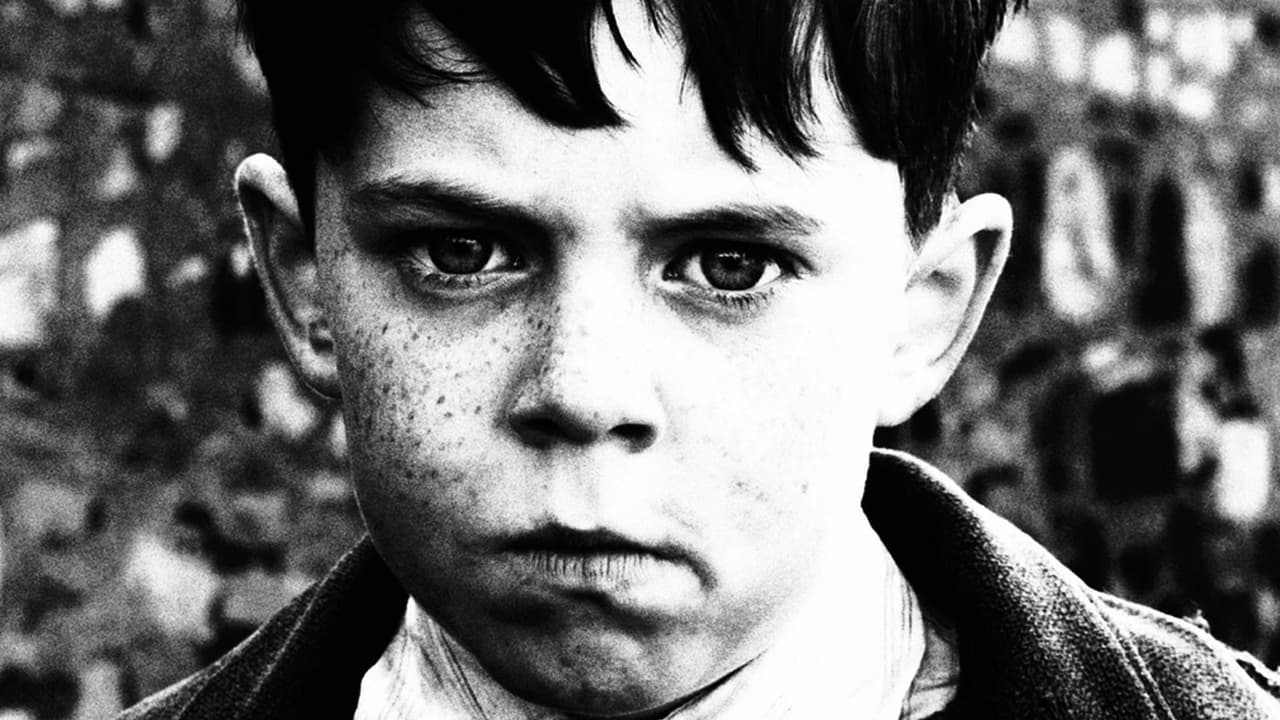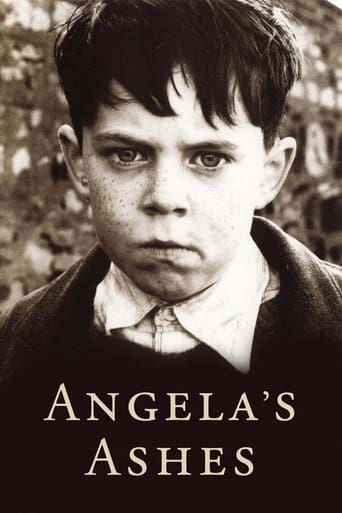

Really Surprised!
... View MorePerfect cast and a good story
... View MoreBlistering performances.
... View MoreWorth seeing just to witness how winsome it is.
... View MoreAlso it goes completely out of the way to make the father look like a drunkard. The family is going through a great depression in ireland of all places and the father loses his job, because of the depression! It also shows him drunk constantly without a job. EVERYONE there drinks after work. If he was coming home drunk without money it was because he wasn't the same ethnicity as the others making it even harder for him to find a job. It's like this movie automatically equates drinking with poor people, when that obviously is not the case, usually poor people work the most and spend the less time with their family not more.
... View MoreDirected by Alan Parker, and based on a memoir by Frank McCourt, "Angela's Ashes" stars Robert Carlyle as the father of a family struggling to live in 1930s Ireland. A coming-of-age tale, the film primarily focuses on young Frank, one of the family's gloomy sons.In the mould of Bill Douglas, whose films offered grim portraits of early 20th century Scotland, Parker conveys the bleak, gruelling conditions of 1930s Ireland. This is a world in which human beings are ceaselessly assaulted by death, disease, starvation, poverty, poor living conditions and miserable weather. Catholicism, and the hopeful embraces of churches and pulpits, pretends to offer some respite. "Angela's Ashes'" better elements are undone by a generic coming-of-age plot. Though funny, moving and even wise in places, the film's overall structure too often forces Parker's material down familiar avenues. The film stars child actor Joe Breed, his furrowed face at times more powerful, more devastating, than the film its in. Emily Watson co-stars as the family's privately suffering mother.7.9/10 – See "Wendy and Lucy", "Stroszek", "My Childhood", "Frozen River" and "Bread and Roses".
... View MoreStill, no surprise here. A movie about life in impoverished Depression-era Ireland was in fact depressing. Ireland holds little promise for young Frank McCourt, the oldest son in a tightly knit family. Living by his wits, cheered by his irrepressible spirit, and sustained by his mother's fierce love, Frank embarks on an inspiring journey to overcome the poverty of his childhood and grow up as a successful author. Based on his memoirs of the same name, the movie begins with McCourt painting the 20th century Turn of the Century, immigrant's nightmare. It wasn't the picture of America dream, but as a broken dream, where his immigrant parents eventually give up and return from New York to their native Ireland when McCourt is just a small boy. Life doesn't get better for young Frank, and that might be the fault of the film and the book. It's too morbid. Children are always dying from pneumonia, typhoid, or tuberculosis. There is a lot of deep wrongs, here that the movie deal with, such as alcoholism, child abandonment, sexual abuse, etc. etc. that some viewers might be turn off of. Some people love hearing people survive against the odds, hints why the novel was popular, but that same fanfare didn't translate into film, because of some keys things. I read the book, they make the father Malachy (Robert Carlyle) look amazing in this movie, but sadly, he was a drunk. Frank blame him somewhat for one death in the family due to his drinking with black pint scene. This film seems to portray him as responsible, hardworking, and optimistic. He is quite different in the book. Still, what a great actor, Robert was. The author is trying to honor his mother by remembering her ashes. Frank's mother Angela (Emily Watson) takes the title of the film due to her endless amounts of smoking. Figuratively, it stands for the darkness of her very hardscrabble life and her dreams of raising a healthy family with a supportive husband have withered and collapsed, leaving her with only cigarettes for comfort and the smoldering ashes of a fire for warmth. While the movie makes her look good, once again, the book is a bit different in my opinion. Angela is still a filthy prostitute. People talk in reviews here about this woman's great self-sacrifice, but I noticed that she never failed to have a cigarette hanging out of her mouth, going through depression as her kids were going hungry and having to walk through the overflow of a toilet just to get into their house. I can't see any great self-sacrifice there, just laziness, lack of self-respect and self-indulgence. The mother is just as bad the father. Emily does a great role as well as Robert. Frank also go through his own guilt. It felt like a hate-filled Bildungsroman movie. Most of the movie, Frank is burdened by guilt at his own sinfulness, particularly the sinfulness of his sexual thoughts and behavior. He frequently worries that he is damned or that he has damned other people due to his Catholicism. While the movie might make Ireland look bad, it's helps cherishes the strong human spirit. Still it doesn't have the same spirit of the book. The music sounds so melodramatically to the point that mainstream America feels depressed. It's kind of hurts the film when the humor of the story comes in. The Irish humor is a little dry for American audiences as it hard for them to understand the Irish culture, the Anti-English Sentiment, and the Irish slangs in the language. Still, I love the movie culture symbolism in theme such as the river Shannon. Still, I can't see anything funny in this film, and certainly nothing noble in any of the characters. The movie is just one shovelful of grim after another linked by an unseen narrator who speaks of them in the past. This a major blow by Alan Parker, as it should have set the narration in present tense, using Frank to quote directly from his book. It is thrown upon unrecognizable and unbelievable caricatures of the Ireland culture that might not be true. We may never know the extent of the town of Limerick's misery. Not all books are meant to be translated into film. Still, they did an OK job with it.
... View MoreFrank McCourt wrote this incredible tale of his brutal life growing up in Limerick Ireland. His home country has worn the scars of it history well on the faces of it's migrating citizens. That face can be easily seen in the tear streaked faces which permeate the film called " Angela's Ashes. ". Being one of them by blood stock, Frank McCourt (Joe Breen: Ciaran Owens: Michael Legge) tells of his impoverished family and their desperate day-to-day struggle just to eek out a living. Their daily efforts are further hampered by an lay-about, alcoholic father (Robert Carlyle) and a haggard mother. (Emily Watson) Beginning in America, then traversing the Atlantic for a better life, then returning, McCourt forgoes the achievements of the family and instead relates the constant ravages of dire poverty. Always in need, the family is forever moving. From meager pitiful surroundings, they move from place to place dealing with ambivalent church authorities and their artificial sympathy, to the constant nagging hunger which is forever present. Indeed, McCourt records in his boyhood memories the silent ridicule of surrounding neighbors. Believing things will never change, Frank is surprised by Aunt Aggie (Pauline McLynn) who favors him. This allows his fortune to change, allowing him to believe the world may yet deliver his family up from the rain-soaked cobblestone streets of Ireland to the Land of Opportunity which is his dream in America. The movie is filled with stark realism, brutal images and gruff bitter memories of object despair. With a musical score written by John Williams and directed by Alan Parker, 'Ashes' will be found on the top shelves of the Classics. ****
... View More